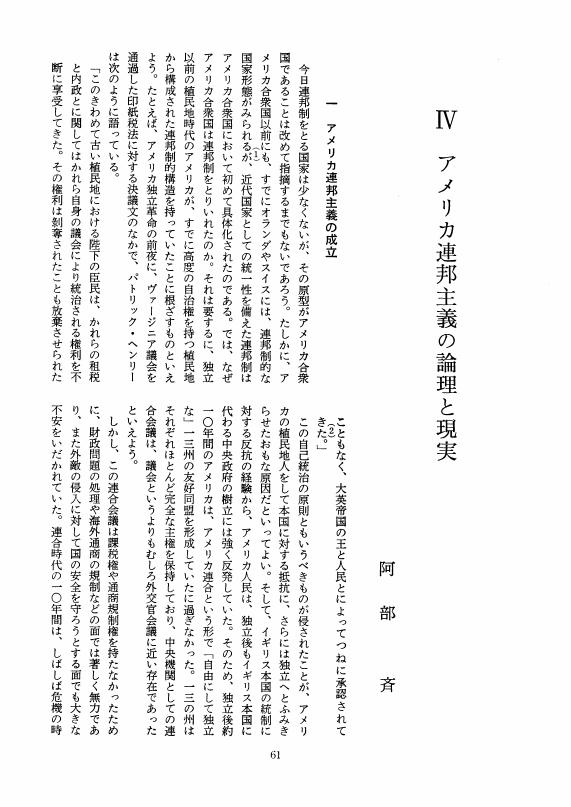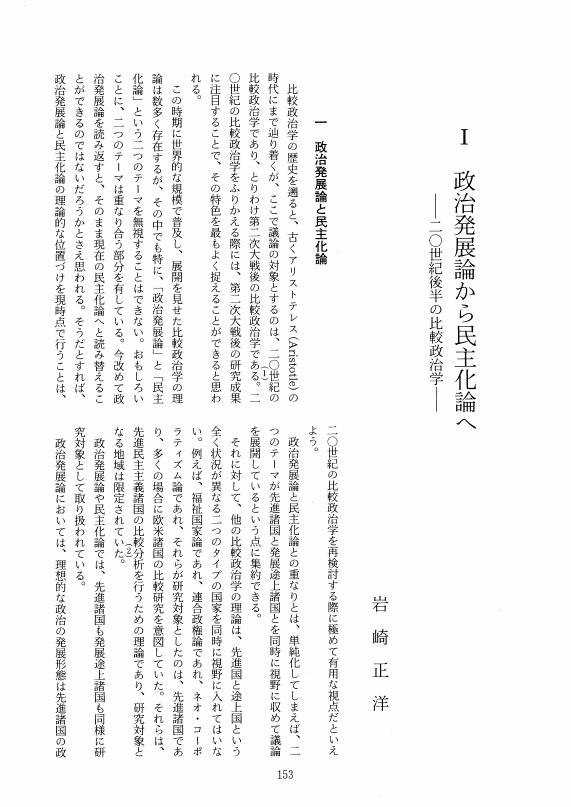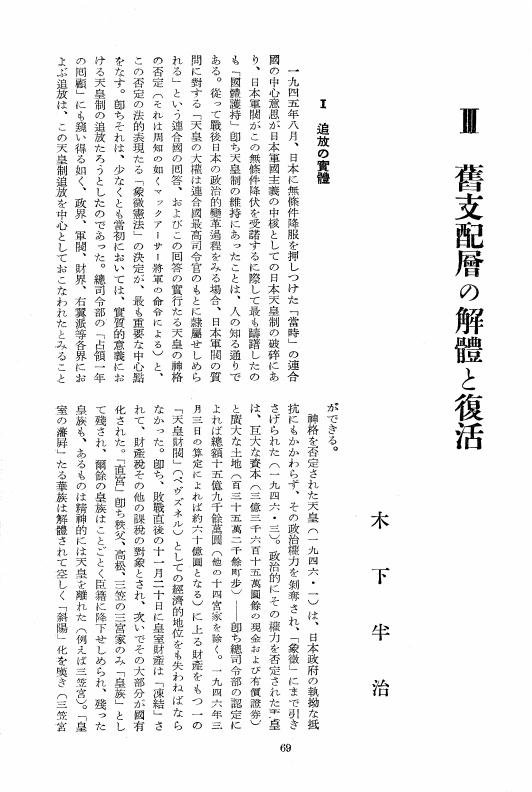2 0 0 0 OA ドイツ -ワイマール・デモクラシーにおける政治指導-
- 著者
- 村瀬 興雄
- 出版者
- JAPANESE POLITICAL SCIENCE ASSOCIATION
- 雑誌
- 年報政治学 (ISSN:05494192)
- 巻号頁・発行日
- vol.6, pp.56-80,83, 1955-03-30 (Released:2009-12-21)
- 参考文献数
- 24
2 0 0 0 OA フランソワ・フュレのフランス革命論
- 著者
- 松本 礼二
- 出版者
- JAPANESE POLITICAL SCIENCE ASSOCIATION
- 雑誌
- 年報政治学 (ISSN:05494192)
- 巻号頁・発行日
- vol.41, pp.191-206, 1991-08-30 (Released:2009-12-21)
2 0 0 0 OA 『危機の二十年』(1939)の国際政治観
- 著者
- 三牧 聖子
- 出版者
- JAPANESE POLITICAL SCIENCE ASSOCIATION
- 雑誌
- 年報政治学 (ISSN:05494192)
- 巻号頁・発行日
- vol.59, no.1, pp.1_306-1_323, 2008 (Released:2012-12-28)
This thesis revisits “Twenty Years’ Crisis” and considers what E. H. Carr means by “realism.” Since the 1990s, many works have challenged the stereotyped picture of a “realist Carr.” Now we know much about a “non-realist” Carr, but there still remain a lot of questions about Carr's “realism.” Contrary to the prevailing image of anti-idealism, Carr's “realism” is a “weapon” to demolish the inequalities between nations, and to rebuild a more equal order. During the 1930s, the “idealists” such as Norman Angell and Leonard Woolf abandoned their optimistic beliefs in public opinion, and advocated the League sanctions against the fascist countries. Together with the pacifists, Carr criticized the League sanctions as a superficial solution, and insisted that the fundamental problem was the inequalities between the “have” and “have-not” countries. His criticisms toward the League were not a denial of the League itself. He criticized the “Coercive League,” which was hostile to the “have-not” countries, but supported the “Consultative League,” which functioned as a forum between the “have” and “have-not.” Now we are in the long fight against terrorism. Global terrorism is, in part, a reaction to global inequalities. Carr's “realism” tells us that military actions alone never beat global terrorism.
2 0 0 0 OA 政治的知識と投票行動
- 著者
- 今井 亮佑
- 出版者
- JAPANESE POLITICAL SCIENCE ASSOCIATION
- 雑誌
- 年報政治学 (ISSN:05494192)
- 巻号頁・発行日
- vol.59, no.1, pp.1_283-1_305, 2008 (Released:2012-12-28)
- 参考文献数
- 19
This paper examines how and how much the levels of political knowledge affect voting behavior in Japan. By adding interaction terms of political knowledge scale and other independent variables to the baseline logit model, the analysis demonstrates that the impact of party evaluation, issue attitudes, and pocketbook evaluation is conditioned by the levels of political knowledge. That is, the effect of party evaluation on voting behavior is significantly stronger among politically knowledgeable voters; political unawareness prevents voters from connecting their issue attitudes with voting decision; the politically less well-informed tend to rely on retrospective pocketbook evaluation when they vote. These findings suggest that taking account of the conditioning effect of political knowledge is critical to make sense of Japanese voting behavior.
- 著者
- 三宅 一郎
- 出版者
- JAPANESE POLITICAL SCIENCE ASSOCIATION
- 雑誌
- 年報政治学 (ISSN:05494192)
- 巻号頁・発行日
- vol.45, pp.173-193, 1994-12-22 (Released:2009-12-21)
- 参考文献数
- 26
2 0 0 0 OA 政策の連続と変容 -日本医療制度の構造-
- 著者
- 衛藤 幹子
- 出版者
- JAPANESE POLITICAL SCIENCE ASSOCIATION
- 雑誌
- 年報政治学 (ISSN:05494192)
- 巻号頁・発行日
- vol.48, pp.135-153, 1997-12-10 (Released:2009-12-21)
- 被引用文献数
- 2 2
2 0 0 0 OA インドネシアにおける「犯罪との戦い」
- 著者
- 本名 純
- 出版者
- JAPANESE POLITICAL SCIENCE ASSOCIATION
- 雑誌
- 年報政治学 (ISSN:05494192)
- 巻号頁・発行日
- vol.60, no.2, pp.2_70-2_86, 2009 (Released:2013-02-07)
Indonesia is widely regarded as a hotbed of transnational violent crime in Southeast Asia. Terrorists and criminal rings have developed cross-border networks rooted in Indonesia. These ‘non-state actors’ quickly emerged as major concerns for post-Suharto governments, posing serious threats to the national security and economy. In response, various ‘wars on crimes’ have been initiated in the name of combating these threats. This article aims to elucidate the politics behind the making of these ‘wars’ by examining the ‘war on drugs’ led by the police (and the national narcotics agency) and the ‘war on terrorism’ orchestrated by the army. I argue that the threat is undoubtedly real, but war campaigns are designed to promote a political strategy of instrumentalizing the threat of transnational violent crime. With this strategy, both the police and the army were able to deflect criticism, reclaim ground lost during the democratization movement, and articulate this revanchism in the legitimizing vernacular of ‘global wars.’ In this sense these security actors are hijacking the ‘violence of non-state actors’ as a Trojan horse to regain power, build budgets, strengthen institutions and undermine reform pressures.
2 0 0 0 OA 戦後日本政治学における「ラスキ・ブーム」の位相
- 著者
- 大井 赤亥
- 出版者
- JAPANESE POLITICAL SCIENCE ASSOCIATION
- 雑誌
- 年報政治学 (ISSN:05494192)
- 巻号頁・発行日
- vol.60, no.2, pp.2_225-2_245, 2009 (Released:2013-02-07)
Harold Laski was once a popular political theorist in postwar Japanese politics. This paper examines the ‘Laski boom’ in the 1950s by comparing three Japanese political scholars: Masao Maruyama, Yoshihiko Seki, and Yasuzo Suzuki. While Maruyama depicts Laski as a consistent thinker, Seki stresses Laski's waver in his theory of state and liberty. Meanwhile, while holding a Marxist perspective, Suzuki sincerely accepts Laski's individualism and his theory of liberty. Through the comparison, we shall comprehend that Maruyama and Suzuki similarly appreciate Laski's political ambivalence between western democracy and communism. However, this paper also suggests a curious irregularity that Maruyama was attracted to Laski's gradual commitment to communism, and that Suzuki learned liberal theory of right from Laski. In conclusion, Laski's dilemma was also the shared dilemma of Maruyama and Suzuki, and this paper proves the ‘Laski boom’ in postwar Japanese politics as the intellectual cross-point where these political scholars intersected.
2 0 0 0 OA 日本官僚制の事案決定手続き
- 著者
- 大森 彌
- 出版者
- JAPANESE POLITICAL SCIENCE ASSOCIATION
- 雑誌
- 年報政治学 (ISSN:05494192)
- 巻号頁・発行日
- vol.36, pp.87-116, 1986-03-28 (Released:2009-12-21)
- 被引用文献数
- 2
2 0 0 0 OA 包摂/排除をめぐる現代デモクラシー理論
- 著者
- 山田 竜作
- 出版者
- JAPANESE POLITICAL SCIENCE ASSOCIATION
- 雑誌
- 年報政治学 (ISSN:05494192)
- 巻号頁・発行日
- vol.58, no.1, pp.1_143-1_162, 2007 (Released:2012-02-22)
So-called “radical democracy” has been concerned with problems of inclusion and exclusion, discussing difference, identity or citizenship. Now radical democracy seems to be divided into two models, agonistic and deliberative. Chantal Mouffe strongly criticizes deliberative democracy through insisting conflict as a fundamental element of “the political”. On the other hand, Iris Young, whose democratic theory is not simply labelled as agonistic or deliberative, conceptualized inclusive democratic model which can be bound on Mouffe’s. Both of them reject the essentialist idea of identity and acknowledge the fact that the constitution of “we” needs the determination of “they”. Mouffe’s idea of “adversary” and Young’s recognition of communication as “struggle” show that democratic dialogue can be a non-violent conflict in a public sphere. Such a conflict should be a type of inclusion because any identity cannot exist without others. The acknowledgement of changeableness of self-identity or self-interest seems to require what Young called “reasonableness” as “hearing the other”, which is not based on particular culture (e. g., white male) nor contain any notion of the common good which might oppress diversity. This can meet Mouffe’s emphasis upon a “practice of civility” which is based on Michael Oakeshott’s notion of societas.
2 0 0 0 OA J. ロックにおけるプライドと市民社会(文明社会)
- 著者
- 中神 由美子
- 出版者
- JAPANESE POLITICAL SCIENCE ASSOCIATION
- 雑誌
- 年報政治学 (ISSN:05494192)
- 巻号頁・発行日
- vol.59, no.1, pp.1_263-1_282, 2008 (Released:2012-12-28)
‘There is something troubling in this type of case, in that the desire for honour, command, power and glory usually exist in men of the greatest spirit and most brilliant intellectual talent. Therefore one must be all the more careful not to do wrong in this way,’ Cicero said in On Duties referring to Julius Caesar. Agreeing with him, John Locke tries to tame the dangerous aspect of ‘the desire for honour, command, power and glory,’ that is, human pride. However he sees this passion as indispensable to human freedom and therefore a free civil society, in contrast to Thomas Hobbes, who attributed the cause of the Civil War to this passion. In Some Thoughts Concerning Education, Locke outlines a free civil society on the basis of human pride. In a polite and civilized society where the ‘Law of Opinion or Reputation’ prevails, human pride can be moderated and cultivated into public spirit based on individual autonomy and freedom. For Locke, civil society is not merely a counterpart to absolute monarchy, but also a basis of human civility, that is, a civilized society.
2 0 0 0 OA 現代グアテマラにおける政治暴力の変容
- 著者
- 狐崎 知己
- 出版者
- JAPANESE POLITICAL SCIENCE ASSOCIATION
- 雑誌
- 年報政治学 (ISSN:05494192)
- 巻号頁・発行日
- vol.60, no.2, pp.2_87-2_107, 2009 (Released:2013-02-07)
The Commission on Historical Clarification in Guatemala (CEH) organized by the United Nations based on the Peace Agreement signed by the Guatemalan Government and the URNG, recognized that the Army and other agents of the Guatemalan State, inspired by the Doctrine of National Security, committed acts of genocide against the Maya people. The CEH named three mutually-dependent “structural” or “historical” causes of genocide: economic exploitation, racism and political authoritarianism. In this article, the analytical framework composed by the combination of four types of violence, (1) Direct political, (2) Structural, (3) Symbolic, and (4) Everyday forms of violence, is used to find out the continuing structure of the state violence which lead to genocide, as well as the changing forms and expressions of the political violence in the aftermath of genocide, focusing on the political impact of the act of “naming genocide” and the “privatization of the violence.”
2 0 0 0 OA 日本における政治學の課題 -發刊の辭に代へて-
- 著者
- 南原 繁
- 出版者
- Japanese Political Science Association
- 雑誌
- 日本政治學會年報政治學 (ISSN:05494192)
- 巻号頁・発行日
- vol.1, pp.1-4, 1950-10-20 (Released:2009-12-21)
1 0 0 0 OA アメリカ連邦主義の論理と現実
- 著者
- 阿部 斉
- 出版者
- JAPANESE POLITICAL SCIENCE ASSOCIATION
- 雑誌
- 年報政治学 (ISSN:05494192)
- 巻号頁・発行日
- vol.32, pp.61-80, 1982-10-08 (Released:2009-12-21)
1 0 0 0 OA 政党内・間の手続き -とくに議院運営委を中心に-
- 著者
- 内田 健三
- 出版者
- JAPANESE POLITICAL SCIENCE ASSOCIATION
- 雑誌
- 年報政治学 (ISSN:05494192)
- 巻号頁・発行日
- vol.36, pp.35-48, 1986-03-28 (Released:2009-12-21)
1 0 0 0 OA ヘルマン・ヘラーにおける「過渡期社会」の政治理論
- 著者
- 安 世舟
- 出版者
- JAPANESE POLITICAL SCIENCE ASSOCIATION
- 雑誌
- 年報政治学 (ISSN:05494192)
- 巻号頁・発行日
- vol.53, pp.71-104, 2002-12-20 (Released:2009-12-21)
1 0 0 0 OA 政治発展論から民主化論へ
- 著者
- 岩崎 正洋
- 出版者
- JAPANESE POLITICAL SCIENCE ASSOCIATION
- 雑誌
- 年報政治学 (ISSN:05494192)
- 巻号頁・発行日
- vol.50, pp.153-166, 1999-12-17 (Released:2009-12-21)
1 0 0 0 OA 舊支配層の解體と復活
- 著者
- 木下 半治
- 出版者
- JAPANESE POLITICAL SCIENCE ASSOCIATION
- 雑誌
- 年報政治学 (ISSN:05494192)
- 巻号頁・発行日
- vol.4, pp.69-85, 1953-03-14 (Released:2009-12-21)
1 0 0 0 OA 幣原外交における政策決定
- 著者
- 今井 清一
- 出版者
- JAPANESE POLITICAL SCIENCE ASSOCIATION
- 雑誌
- 年報政治学 (ISSN:05494192)
- 巻号頁・発行日
- vol.10, pp.92-112, 1959-03-31 (Released:2009-12-21)
1 0 0 0 OA 内務官僚と二・二六事件後の政官関係
- 著者
- 黒澤 良
- 出版者
- JAPANESE POLITICAL SCIENCE ASSOCIATION
- 雑誌
- 年報政治学 (ISSN:05494192)
- 巻号頁・発行日
- vol.51, pp.157-169, 2001-01-30 (Released:2009-12-21)












